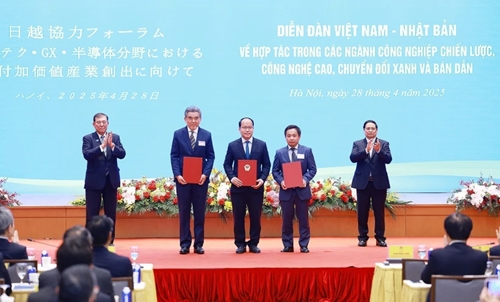The event was attended by leaders of ministries, agencies, and Government bodies from both countries, along with more than 300 delegates representing Vietnamese and Japanese businesses and universities.
In his address, PM Ishiba highlighted Japan’s role in Vietnam’s economic growth since the 1990s when its manufacturing sector expanded into the country. He praised Vietnam’s 100-million-strong market and skilled workforce, calling it a prime investment destination.
Reflecting on his visit to Thang Long Industrial Park, Ishiba underscored the deep ties between Japanese and Vietnamese firms. Amid global economic uncertainties, he underlined the potential for both nations, with interconnected supply chains, to collaborate on advancing industrial capabilities.
    |
 |
|
PM Pham Minh Chinh and his Japanese counterpart Ishiba Shigeru witness the exchange of cooperation agreements. (Photo: VNA) |
Japan, he affirmed, is committed to supporting Vietnam’s resilience to external shocks through close public-private partnerships, including workforce training and carbon emission reduction, in line with the "New Era" vision outlined by Party General Secretary To Lam.
Ishiba welcomed Vietnam’s focus on high value-added to drive industrialization, modernization, and administrative reform.
To this end, Japan will launch a semiconductor technology engineer training program at Vietnam-Japan University and host about 250 doctoral researchers in the semiconductor field, supporting half of Vietnam’s national target. Japan will also expand next-generation human resources exchanges in advanced sci-tech. Additionally, Japan will back the construction of a polycrystalline silicon production plant and promote carbon reduction in Vietnam’s industrial parks. Collaboration with Vietnam’s National Innovation Centre (NIC) is connecting startups with leading enterprises, yielding early successes.
In energy and carbon reduction, joint projects in offshore wind power, power transmission networks, and biomass energy are progressing. Ishiba expressed Japan’s eagerness to deepen public-private cooperation for a stronger, mutually beneficial partnership.
In response, PM Chinh stressed Vietnam’s people-centered approach, with sci-tech and innovation as key drivers, and international cooperation as a breakthrough. He outlined Vietnam’s foundation on three pillars: socialist democracy, a socialist rule-of-law state, and a socialist-oriented market economy, underpinned by proactive, substantive and effective global integration.
He detailed Vietnam’s “strategic quartet”, including making breakthroughs in sci-tech, innovation and national digital transformation; streamlining the political and administrative systems; fostering the growth of the private sector; and deepening global integration in the new context.
Vietnam is committed to developing an innovation ecosystem, improving institutional frameworks, expanding infrastructure, enhancing workforce quality, and drastically improving business environment, aiming for a green, inclusive, and sustainable economy, he said.
He assured that Vietnam views the foreign-invested sector as a vital component of the economy, guaranteeing investors’ legitimate rights and interests, political stability, social safety and order, and favorable investment policies.
Vietnam prioritizes efficiency in time, brainpower, decisive and timely actions to seize opportunities without delay, he said, adding that the country commits to mutual listening and understanding among businesses, the State and the public; sharing visions and actions for rapid and sustainable development; and working together for mutual success, prosperity, happiness, and national pride.
The host called for continued Japanese official development assistance (ODA), particularly in strategic industries, hi-tech, digital transformation, green transition, and innovation. He sought enhanced cooperation in technology transfer, green finance, workforce training, semiconductor, artificial intelligence, international financial centers, and green transition, urging Japan to further support the NIC as a nucleus of Vietnam’s innovation ecosystem. He also encouraged Japanese firms to expand investments in strategic sectors to boost Vietnam’s competitiveness and integration into global value chains.
Representatives from Vietnamese and Japanese firms discussed strategic cooperation, introduced outstanding initiatives, and signed agreements to foster a hi-tech and innovation-driven partnership ecosystem.
Vietnam is rolling out comprehensive policies to develop strategic industries, including artificial intelligence, semiconductors, big data, clean energy, green technology, and digital infrastructure. The country aims for its digital economy to contribute at least 30% of GDP by 2030, rank among the top 40 globally in innovation, and achieve net-zero carbon emissions by 2050.
Japan remains a trusted and strategic partner, with foreign direct investment exceeding USD 78 billion and its position as Vietnam’s largest ODA provider.
Source: VNA